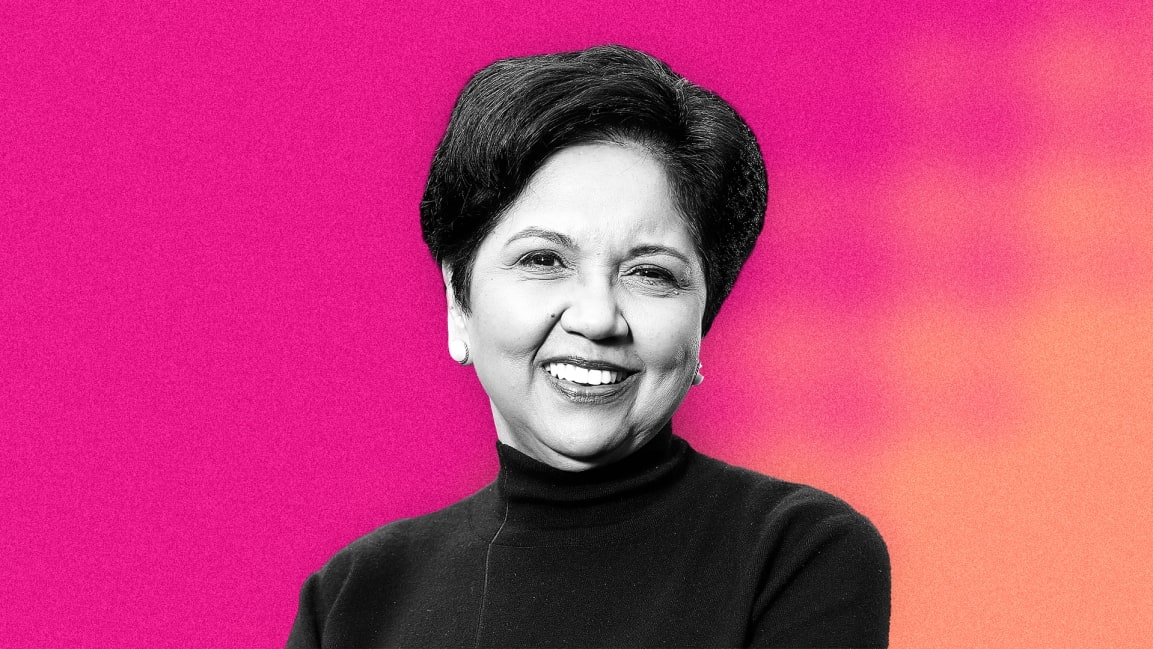Indra Nooyi and the power of speaking up at work
I was always aware that women in the corporate world were climbing a steeper, more slippery ladder than the men. Even when I was on the very top rung, I was still on the women’s ladder.
As PepsiCo’s chairman for a dozen years, I led our board meetings sitting at the head of a large U-shaped conference table. We were eight men and four women. The meetings would begin with friendly greetings and then get down to business. We analyzed performance, risks, strategy, talent, and what we saw across the world. I was lucky to work with a supportive board, but some of the comments in public and private by a board member or two were rude and patronizing, remarks I imagine they wouldn’t dare make to a male leader. Additionally, I had put up with a couple of the men thinking it was okay to talk over me or interrupt me mid-sentence. I found this simply unacceptable and tried not to stew about it. Once, Sharon Rockefeller, who was a valuable board member for almost 30 years, had had enough: I watched her tell one of the men that his behavior of interrupting her constantly had to stop. She was direct, firm, and public. Everyone got the message. Every board needs a Sharon Rockefeller.
Another board member, early in my days as CEO, insisted on a one-on-one meeting with me every six weeks or so, almost always requiring me to travel to his home city to see him. He’d ask me questions, and my answers were always greeted with “I wouldn’t say it that way.” I’d then politely ask for his suggested response, hoping to learn something. He’d almost always repeat, verbatim, what I’d just said. I viewed this as a funny power game. He was a newly retired senior business executive who was struggling with giving up his position of power. He wanted to retain his influence through me. It drove me crazy—I viewed these dinners as a waste of my time.
When I was rising in PepsiCo, like many female senior executives, I was also the only woman in the room when our management team sat around debating tactics. I was always well-prepared and offered good insight, and I know I was respected. But, quite often when I made suggestions, someone would jump in and say, “oh no, Indra, that’s too theoretical.” A few minutes later, a man would suggest the exact same thing, using the same words, and be congratulated for his terrific, insightful idea. I once leaned over to a senior operating executive and loudly asked him to bring up a thought of mine. “Otherwise, it will be viewed as too theoretical,” I quipped. That ended the “too theoretical” comments.
I really didn’t think I could do all that much about how people treated me personally, but I always tried to support women in the organization. I made sure my corporate strategy team was as good as it could be, and it ended up 50% female. I held many women-only town halls to let female employees talk about anything on their minds. I quietly spoke with some about how they presented themselves, from how they sat in meetings to how they communicated their ideas. Most took my feedback and acted on it. A few thought I was too conservative and pushed back, although everyone accepted that I had their best interests at heart.
I also weighed in with a female perspective on marketing and advertising campaigns. One Diet Pepsi TV commercial in the 1990s sticks in my mind. The setting is a fancy wedding with the brides- maids and guests waiting around. Something has gone wrong. One woman tells another that the bride’s diamond is small, and then it becomes clear that the groom isn’t showing up. The resplendent bride is crying. Her father gives her a Diet Pepsi. She sips. She peps up. She looks at her dad and says, “This is diet?”
I saw this ad in an internal screening and told the creators that I didn’t think it would encourage women to drink Diet Pepsi because it was insulting. None of the men agreed. And they were furious that I weighed in, noting that this wasn’t my responsibility. The campaign went ahead. Later, a few of those guys actively avoided talking to me about the numbers when Diet Pepsi had a disappointing year.
I made one more memorable, very visible change. I had the beautiful French cobblestones on the walkway between our buildings ripped out in favor of an architecturally tasteful, flat surface. The cobblestones, installed in the late 1960s, were fine for men in business shoes but a menace for women wearing the heels expected of us in our professional wardrobes. The change infuriated Don Kendall, who had retired as CEO in 1986 but still kept an office. When he saw the construction, he fumed, “who’s messing up my walkway?” My male colleagues, who had long known those cobblestones were a hazard and seen people struggle and even trip and fall, pointed at me. Why they had never fixed them, I would never know. Don, surprisingly, never dared confront me about it.
Later, my female colleagues, including Don’s wife, Bim, thanked me for years for changing those stones.
Excerpted from My Life in Full: Work, Family, and Our Future by Indra Nooyi, with permission from Portfolio, an imprint of Penguin Publishing Group, a division of Penguin Random House LLC. Copyright © 2021 by Indra Nooyi.
Indra Nooyi is the former CEO and chairman of PepsiCo and author of her new memoir, My Life in Full. She has been featured in Forbes’ “The World’s 100 Most Powerful Women,” Fortune’s “Most Powerful Women,” and Time’s “100 Most Influential People in the World.”
(41)



